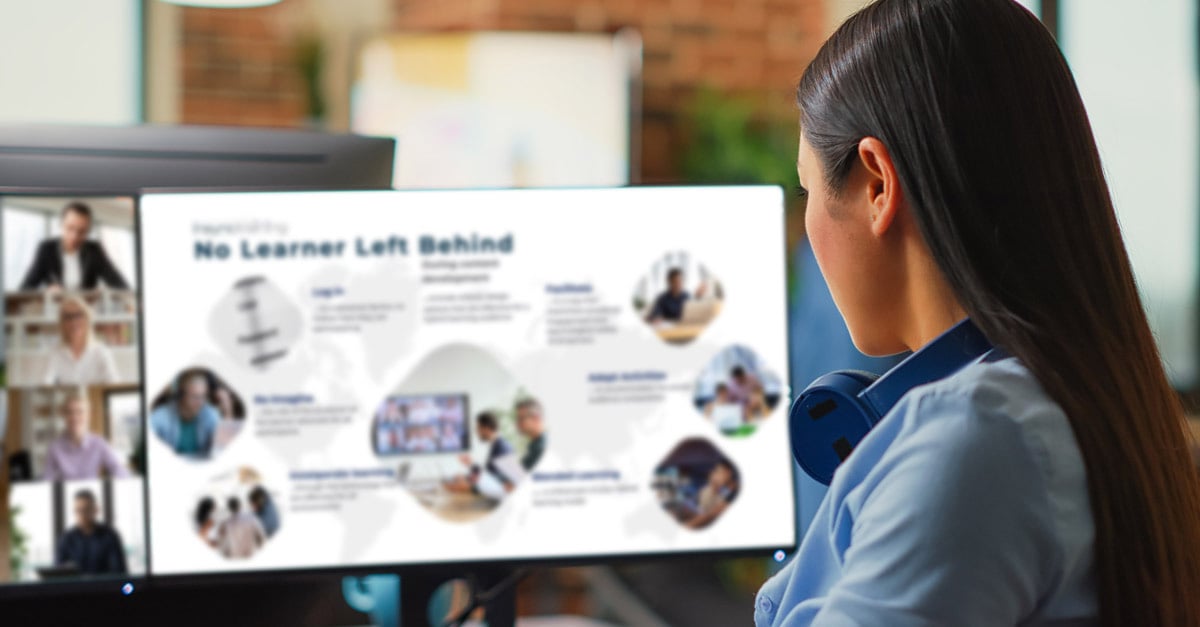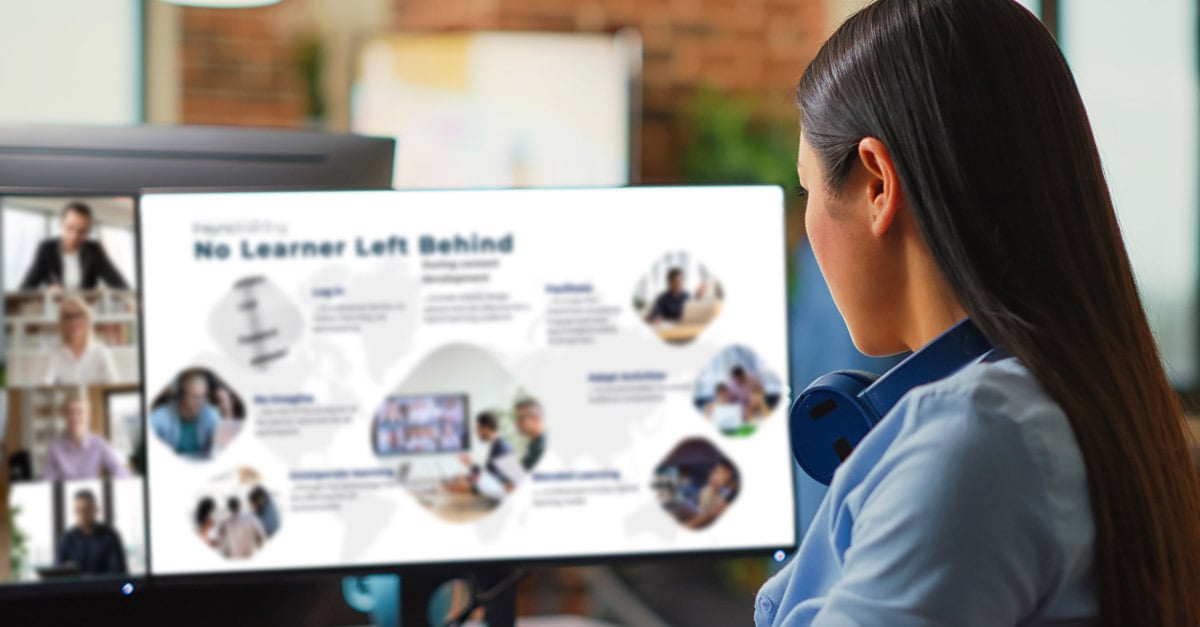Hot Off the Press! New Blended Learning Book from Jennifer Hofmann
Many organizations have discovered that blended learning needs to be a priority in order to maintain employee effectiveness. That's a good thing....
5 min read
 Jennifer Lindsay-Finan
:
Oct 11, 2023 11:30:21 AM
Jennifer Lindsay-Finan
:
Oct 11, 2023 11:30:21 AM

The role of the virtual classroom producer has changed significantly in the world of virtual and hybrid learning.
No longer confined to simply "making the talent look good," these professionals have emerged as drivers of environmental engagement and vital supporters of facilitators' mission to engage learners. While they continue to operate mostly behind the scenes, the virtual classroom producer's influence and impact are now being recognized.

Producer. Virtual Classroom Host. Moderator. Various terms have emerged to capture this complex role that extends beyond technical support in virtual classroom platforms.
For more than 20 years, InSync Training has provided this service for a variety of clients. By outsourcing virtual production, clients can leverage external expertise, reduce costs, save time, access advanced technology, and focus on their core business activities. Such benefits make outsourcing an attractive option for many organizations looking to create engaging and immersive virtual experiences.
[Read More: Outsourcing Virtual Training Services]
However, many organizations have the ability to provide this support internally. With proper training, producers can seamlessly transform a virtual professional development program into a dynamic and engaging experience. They play a crucial role in ensuring trouble-free operations, facilitating fast-paced interactions, keeping learners actively involved, and providing consistent support to the virtual classroom facilitator.
When selecting a virtual producer, consider the following key qualities:
Supportive Personality: Look for a producer who thrives in the role of the "unsung hero." They should be dedicated to supporting the team throughout every stage of the virtual class, ensuring smooth operations and resolving any issues that may arise in real time.
Experience: Given their critical role, it's important for the producer to have prior experience in virtual instructional processes. Ideally, they should possess production experience, but they can also come from within the team, having demonstrated proficiency in a different role.
Technical Knowledge: A producer should possess a solid understanding of virtual platforms and be able to anticipate and mitigate potential distractions. They should be well-versed in troubleshooting technological issues in virtual classroom software to ensure a seamless experience for all participants.
Instructional Support: The role of the virtual producer is evolving: they now serve not only as technology managers but also as instructional support and learner advocates. Look for someone who can actively contribute as a co-instructor, enhancing the overall learning experience while improving the classroom environment.
By prioritizing these qualities when selecting a virtual producer, you can ensure that your events run smoothly, engage participants effectively, and provide valuable support to the facilitator and learners alike.
The producer works closely with the facilitator to ensure a smooth learning experience for everyone in the professional development program. That collaboration often looks like this:
Logistical Review: The producer raises any problems they identify with logistical information. They help the facilitator rehearse and run through the content ahead of time, ensuring any activities will run smoothly. They discuss any potential accommodations that may be required for learners on mobile devices or whose first language is not the spoken language in the class.
Technology Check: Before the class starts, the producer opens the virtual classroom and checks that all the settings are correct and that any polls or other activities are prepared and ready to go. They help the facilitator set up before any learners arrive, ensuring a clear audio connection as well as checking the visibility of any slides or videos being used.
In-Class Support: This includes welcoming learners in the live online learning, providing technical instructions, signposting to resources using chat, and setting up whiteboards, polls, and breakout rooms. It might also include sending the facilitator timing prompts and notes about learners who aren’t as active as others, taking attendance, and managing a recording, among other things. Producers may even take the lead by facilitating a particular section or running an activity to provide an additional voice and let the facilitator take a short break.
After-Class Wrap Up: The producer configures and distributes the recording, marks attendance and reports back on any other outputs from the class. They may send information to the learners about self-directed work or distribute follow-up details. Importantly, they’ll debrief the class with the facilitator and make any recommendations for next time.
It's important to recognize that every team has unique requirements for a producer and that the dynamics of their relationships may vary.
To support an effective professional development program, producers should develop the following competencies:
Be Universally Engaging. The producer really is the driver when it comes to environmental engagement. It’s up to the producer to ensure that everyone knows how to fully participate in the virtual classroom. Doing so means helping the facilitator become familiar with any tools they’ve not yet used as well as helping learners become comfortable and digitally fluent in their learning environment.
Create a Nurturing Environment: Often, the producer welcomes learners as they join the class, acting as the first point of contact for learners. Producers can take this opportunity to set the tone for the class and start making emotionally engaging connections with the learners before the class even starts. The producer works alongside the facilitator to create the feeling of psychological safety in the virtual classroom.
Stimulate Curiosity: They should join the facilitator in stimulating curiosity and intellectual engagement for the learners. They can act as a learner advocate, re-state instructions in chat, or even speak up when clarification is needed. They can annotate key points on a slide or use the annotation tools to point to specific elements the facilitator is discussing to help learners focus.
Live online learning presents some unique challenges for producers, including the need to
Predict the Unpredictable: Producers are typically highly organized people who anticipate every eventuality, but of course the unexpected happens! It can be challenging to have enough back up plans for their backups.
Troubleshoot Technology: Not just sometimes . . . but everything, all the time. There are so many devices and possible set-ups now that producers need to almost be mind readers to troubleshoot learners’ issues. Thankfully, they don’t need to know the in's and out's of every single device, but they do need to be able to work with the learner or their IT team to troubleshoot.
Anticipate the Needs of Facilitators and Learners: Again, producers almost have to be mind readers and must anticipate what the facilitator needs next. This is especially important when it’s a new relationship and if a rehearsal hasn’t been possible. Producers work with checklists, discuss plans before class starts, and keep open private communication with the facilitator throughout the class. Producers must also always be fully present and ready to be flexible and adapt to whatever changes are requested.
A Happy Facilitator. It’s immensely rewarding to know that the facilitator appreciates your support and maybe has even learned something from you. Perhaps you’ve shared an easier way to do something or a new trick thanks to a platform update and the facilitator shares their appreciation with you.
Happy Learners. The learners think of you as part of the team that made the class great. The reward is their thanks for any support they might have needed privately, but also all the extra attention you added to make the learning experience successful and smooth.
Continuous Personal Learning. Producers get to learn every single day! They support a myriad of subjects with people from all over the world. They also learn from other producers who are constantly sharing tips and sharing the latest information after each virtual platform update.
Partner with InSync and embark on your journey to become a Master Virtual Producer. Here's a sneak peek into what you'll get:
Earn your Virtual Classroom Producer Certification today and become the indispensable MVP your organization needs. Take the first step by enrolling in our Master Virtual Producer series. Ready to get started? Click here to enroll to become a Master Virtual Producer
Many organizations have discovered that blended learning needs to be a priority in order to maintain employee effectiveness. That's a good thing....

Our research identified that learner engagement turns on three factors: An emotional response to the training—How does the learner “feel” about the...